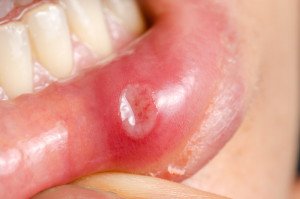What’s The Difference Between A Canker Sore And A Cold Sore?
 There are very few people out there who haven’t dealt with some sort of occasional painful swelling in or around the mouth. The two most common causes are essentially harmless, but it can help to know exactly what they’re supposed to look like and what causes them because mouth sores sometimes indicate a much more significant problem.
There are very few people out there who haven’t dealt with some sort of occasional painful swelling in or around the mouth. The two most common causes are essentially harmless, but it can help to know exactly what they’re supposed to look like and what causes them because mouth sores sometimes indicate a much more significant problem.
Canker Sores
These yellowish-white sores can form just about anywhere in or around the mouth, including on the lips, on the inside of the cheeks, and on the gums, tongue, or the roof of the mouth. They most often show up one or two at a time, but some people can wind up with ten at once. They swell up over the course of a couple days, throb painfully when exposed to capsaicin or a strong acid, and then slowly disappear over the course of a week or two.
Nobody really knows what causes canker sores. Suspects include viruses and bacteria, but the leading suspect is an autoimmune disorder since canker sores aren’t contagious. Certain factors like stress and menstruation seem to make canker sores more likely, but ultimately it’s a mild condition that affects half of everyone and only rarely leaves so much as a scar.
Cold Sores
Unlike canker sores, the cause of cold sores is well known: herpes simplex virus type 1. HSV-1 is extremely common throughout the world, to the point where eight out of every ten people have caught it at some point in their lives, usually before they turn ten.
Initial symptoms which follow catching the virus include a fever, nausea, and vomiting, but unless the victim has a compromised immune system HSV-1 is very rarely fatal. After the initial infection, HSV-1 occasionally recurs as a series of small red blisters which form around the mouth, pop, and then scab over. The fluid released by cold sores is highly contagious, so even though 80 percent of the population has it, it’s not a good idea to kiss anyone while your cold sores are active.
If you should happen to discover a kind of mouth sore that doesn’t sound like either option above, or if your mouth sore lasts for much longer than it should, then you should probably contact a dentist right away to find out what it really is. It may turn out to be nothing more than a particularly tenacious canker sore, but it’s better to find that out right away than to ignore it until it’s too late to do something.